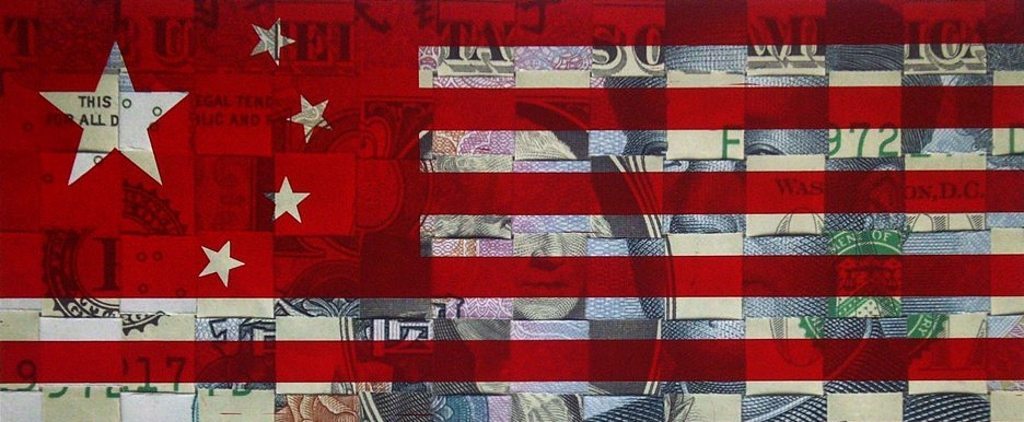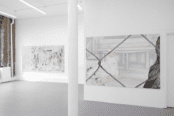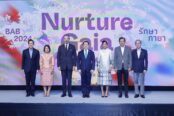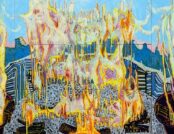[dropcap style=”font-size:100px;color:#992211;”]C[/dropcap]himerica is the word for the intertwining of huge global powers, China and America.
To celebrate the approaching Chinese new year and to acknowledge the growing power of China Trebuchet will take a critical look at the countries relationship with America, its rise and influence in the arts and on artists.
Korean artist Chunwoo Nam’s image above is a conflation of two potent symbols of power and national identity, like it or not these two very proud, different and self interested states are becoming ever more intertwined. A collection of works can be found here, Nam’s multi layered digital prints are ambiguous, is the symbiosis positive or a many headed and unpredictable monster in the making?
Below Natalie Andrews explores the term and its importance.
Globalisation the buzz word for right now
The term globalisation has come to be used to describe our current epoch, that is the epoch of 21st century western first world cultures. Globalisation is increasingly being used in cultural criticism and as an observation based only on my own experience the term appears to be more relevant now than post-modernism or modernism to understand the dynamics of our time, it is for example appearing in the course work of various graduate courses and is increasingly written about in culturally critical magazines. The word like the terms modernism or post-modernism is an attempt to name the powerful forces which direct many interconnected cultures,
“Globalisation is the process by which the world is becoming increasingly interconnected as a result of massively increased trade and cultural exchange. Globalisation has increased the production of goods and services. The biggest companies are no longer national firms but multinational corporations with subsidiaries in many countries,” BBC Bitesize 1
Like trying to define other broad terms it’s difficult to pin down or reduce globalisation to a single definitive or easily understood description, like other epoch defining concepts its tentacles spread so broadly and are apparent in so many different ways that you might discuss the influence of Scandinavian noir in redefining thriller narratives 2 all the way to coltan mining and the plight of the Congo in the shadow of huge corporations.3
They’re selling you out and
you don’t even feel the sting
Thinking about the world through the lens of globalisation emphasises certain clearly identifiable factors; Media technology including the internet, television, phones 24hr news networks and all the subsequent industries dependant on this technology, Improved transport links both for goods and peoples allowing for both international travel and trade, The interdependence of otherwise sovereign and separate nation states for example the increased interdependence of China and America spawning the term Chimerica.
Naming The Transformation
“Chimerica was a term coined by economist Niall Ferguson to indicate the global dominance of the dual country that is China and America. But Kirkwood’s play highlights the sharp differences, as well as the similarities, between the twin superpowers. In America, Joe’s bolshie individualism as a photographer who records world events is ultimately celebrated; in China, Zhang Lin, who has already suffered for his involvement in the Tiananmen protests, pays a heavy price for inciting unrest,” Review of ‘Chimerica’ by Michael Billington in The Guardian Wednesday 29 May 2013

The Almeida’s publicity poster for ‘Chimerica’ a play by Lucy Kirkwood
As Billington mentions in his favourable review of Lucy Kirkwood’s play the term Chimerica was first used by Ferguson in his article, ‘What “Chimerica” Hath Wrought’ in the publication The American Interest. 4
like a marriage made in heaven.
Put simply, one half did the saving,
the other half the spending
Here Ferguson identifies the US economy and financial system as a core strand of its world power just as important as its military might and its status as a safe haven for technological research, he goes on to state that the bailout5 in 2008 grossly undermined the free market credentials of the world’s policeman leading many to conclude that America will lose its hold on power. Ferguson then goes on to highlight the misguided optimism of sum pundits who being liberal critics had stated all nations should embrace the American way condemning both Islamic and Asian alternatives,
“who argued that the rest of the world should hurry up and embrace the “Washington Consensus”, or prepare to be sold short. One lot derided the political failure of the Muslim world; the other lot heaped scorn on Asian ‘crony capitalism’, supposedly the root cause of the 1997–98 Asian financial crisis,” Niall Ferguson, What Chimerica Hath Wrought’ The American Interest 2009
Ferguson describes the nature of the ‘hubristic’ fall he imagines these experts must have experienced in the wake of global events flying directly in the face of their confidence,
“The neocons got their comeuppance in Iraq, where American forces were not, after all, greeted as liberators with sweets and flowers. The neolibs got theirs in September, as a Republican Treasury, headed by the former CEO of Goldman Sachs, nationalized first the country’s biggest mortgage lenders and then its biggest insurance company, only to let the investment bank Lehman Brothers fail. One of the few things Barack Obama and John McCain could agree on in the final phase of the presidential campaign was that something was rotten on Wall Street. The stage seemed set for the demise of what has been called “market fundamentalism” by George Soros (paradoxically one of its biggest beneficiaries), meaning the belief in the self-regulating nature of what has turned out not to be self-regulating at all,” ibid
Ferguson’s essay then highlights the economic and political realities which bind together nations in a globalised world, he emphasizes the symbiosis of America and China and the slightly desperate nature of this symbiosis,
“For a time, it was a symbiotic relationship that seemed like a marriage made in heaven. Put simply, one half did the saving, the other half the spending,” ibid
While Ferguson acknowledges other players in this arena he is absolutely clear that,
“Chimerica above all others was the real engine of the world economy,” ibid
His essay concludes that this symbiosis which many predict will give way to a new world power namely China, is in his view set to continue and the dynamics which drive it will continue to do so. In short he is not ready to write off American power but he is totally clear that this power is changing because of interdependence and globalisation, the effects of which we might conclude given the cultural differences will lead to telling collisions and conflicts.
Returning to Kirkwood’s play ‘Chimerica’ which explores the collisions of those two seemingly alien but never the less intimate partners,

Benadict Wong as Zhang on the set of ‘Chimerica’
Billingdon also highlights the contrast between the American Joe and the Chinese Zhang the former egotistical, naïve and concerned with self-regarding insight although well intentioned the later sad and in jeopardy another reviewer Caroline McGuinn puts it differently as the contrast of selfishness and private heroism, 6
“Stephen Campbell Moore precisely captures Joe’s mix of reckless idealism and self-absorption, Benedict Wong eloquently conveys Zhang Lin’s private grief and public defiance,” Review of ‘Chimerica’ by Michael Billington in The Guardian Wednesday 29 May 2013
Blending of Cultures
There is sense from reading Ferguson’s essay and looking at images and reviews of Chimerica that interested parties like Ferguson and Kirkwood are not just fascinated by the clash and contrast of these cultures but the merging and collapse of one into the other. At the moment the background that produces characters like Kirkwood’s Joe or Zhang are very different, but in global politics its increasingly harder to see a clear moral superiority, think of Trumps appointment in the white house and the dismay of Chinese officials at his destabilising effect on world politics and nuclear brinkmanship.
Billingdon draws attention to the plays interest in photojournalism both in the central characters obsession with the image of the protester at Tiananmen square and in the set design and effects accompanying the piece. Photojournalism which is concerned with truth and yet is just as easily drawn into sensationalism and entertainment.
Ai Weiwei Cultural Prankster/Enemy of the State
My first experience of the term Chimerica was in an article about Ai Weiwei the Chinese dissident artist, ‘Ai Wei Wei’s Path From Cultural Prankster to Enemy of the State’ by Ben Davis.7
Davis is clear in highlighting the background each culture creates seeing and the differences especially in consequences each offers outspoken figures,
“Of course, there is something exotic about this story that feeds the furore. In our neck of the woods, artists — even very political artists — are tolerated as either Cassandras or clowns. Art in general functions as a zone of imagined freedom, whose outsize, libertine character is in exact inverse proportion to any consequences that it might have for the artist,“ Ben Davis, Ai Wei Wei’s Path From Cultural Prankster to Enemy of the State, 2011
Interestingly Davis sees Weiwei as embodying both the qualities of self-indulgent idealism and quiet heroism (terms applied to Kirkwood’s Joe and Zhang respectively) An artist who is at once capable of work described as ‘glib, a hip cultural prank’ and/or ‘social sculpture’ a reference to ‘Snake ceiling’ described as ‘urgent and humane’.
WeiWei’s qualities of moving between cultures and being able to marshal support from rich donors, using social media to build a huge profile, one capable of simultaneously landing him in trouble and keeping him alive during his infamous interrogation and arrest. These qualities and the absolutely modern context of this situation prompts Davis to claim,
“he has inhabited more directly than almost any other artist I know the contradiction of our world, where the fantasy of freedom and dissent depends on a situation that is ruthlessly unfree. This is the world that we all live in together — which makes Ai Weiwei, today, as close to a universal artist as we have,” ibid
His status would be impossible without social media without the global forces which saw modern media technology intrude into the repressive and insular Chinese state, this Weiwei acknowledges in an interview with Tania Branigan for The Guardian online,
“People often say I started to become too outspoken after a certain period. It’s all because of the internet – if we didn’t have this technology I would be same as everybody else; I couldn’t really amplify my voice,” Ai Weiwei Interveiw with Branigan published at Guardian online Thursday 18 March 2010 08.00 GMT
And yet as Davis highlights it is the same forces of interdependence and globalisation which are seeing an increasingly cynical international community unwilling to intervene meaningfully in the plight of people Ai refers to when he speaks of those who don’t have a voice, ‘if they speak out they are crushed’
Chimerica above all others
was the real engine of the
world economy
“Ai himself has expressed this dynamic succinctly, in the context of rising concerns about Internet censorship: “I don’t think there is international pressure anymore,” he told Lucy Birmingham in 2009. “Because of the economic crisis, China and the United States are bound together. This is a totally new phenomenon, and nobody will fight for ideology anymore. It’s all about business.” ibid
As an international figure propelled to fame as a result of globalisation and now battling the apathy of an intertwined globalised world, Weiwei is able to illustrate some of the complex and unexpected results of what Ferguson predicts will be an enduring future with consequences for all of us.
Are We To Blame?
In another play ‘The Arrest of Ai Weiwei’ by Howard Brenton8 at the Hampstead theatre In 2003 also staring Benadict Wong this time as the outspoken and ill fortuned artist, its an odd but undeniable consequence of globalisation that Benadict Wong a relatively unknown television actor with a social conscience has become a kind of simulacra of not just Weiwei but for the idea of dignified resistance and as both Zhang and Weiwei speaks truth not only to power but also to us.
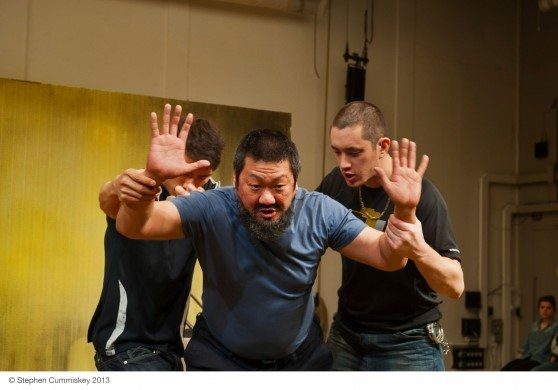
Play: ‘The Arrest of Ai Wei Wei’ by Howard Brenton at the Hampstead theatre In 2003
Breton at the close of his play has Benedict Wong stare directly out at the audience members and deliver an ominous sermon,
“They’re selling you out and you don’t even feel the sting. Your ignorance and your silence are the price you pay for the security of your life style. And why not? Peace and harmony. And shopping…..you can be a wonderful person inside, but if you don’t desire to change, then all you are is a perfect modern slave,” Brenton, The Arrest of Ai Weiwei 2013
After a long while of sympathising with Ai Weiwei and condemning the Chinese forces severe and disproportionate actions Breton’s sermon is truly radical, it betrays easy sympathies and forces the audience to look at themselves. Shifting the criticism from brutal Chinese forces defined by paranoia to a lazy west defined by apathy and addiction, a life of distractions where everyone is ready to condemn China from a distance. Brenton brings the hypocrisy and mutual benefit of the powerful in both the east and west home and in a globalised world its these figures, performers and artists who will live up to the promise of the term globalisation and offer individuals the agency to at least see the links and understand the forces which dominate our world.
Being able to name it and recognise it is the beginning of that agency.
________________________________________________________________________________
Lead image: Chimerica Flag. Chunwoo Nam. Linocut on archival digital print on Rives BFK paper. 14 3/4″ x 27 3/4″. Edition of 20
1 There are many basic descriptions or definitions of globalisation available they all share the core points highlighted in this quote from an educational website, http://www.bbc.co.uk/schools/gcsebitesize/geography/globalisation/globalisation_rev1.shtml
2 A good article highlighting this influence is located here, http://www.bbc.co.uk/news/entertainment-arts-36106213 How ‘Scandi crime’ made a killing By Vincent Dowd • 28 April 2016.
3 It is the interconnected proliferation of communications technology; mobile phones, home computers, the internet, television satellites and the general centrality of media culture that links these two symptoms via the forces of globalisation, 1 it allows a small area of northern Europe to influence how Hollywood producers make films and television raising the profile of writers like Mankell or Larrson and 2 it is allows large corporations to exploit indigenous people in central Africa paying off warlords to keep the piece while extracting rare minerals to build more phones, computers…https://www.youtube.com/watch?v=mCUtElvg0F4
4 This Appeared in: Volume 4, Number 3 Published on: January 1, 2009 and can be seen here, https://www.the-american-interest.com/2009/01/01/what-chimerica-hath-wrought/ Ferguson cites both himself and Moritz Schularick from ‘Chimerica’ and the Global Asset Market Boom”, International Finance (December 2007).
5 The Emergency Economic Stabilization Act of 2008 (Division A of Pub.L. 110–343, 122 Stat. 3765, enacted October 3, 2008), commonly referred to as a bailout of the U.S. financial system, is a law enacted in response to the subprime mortgage crisis authorizing the United States Secretary of the Treasury to spend up to $700 billion to purchase distressed assets, especially mortgage-backed securities, and supply cash directly to banks. Information here from Wikipedia.
6 TimeOut Review by Caroline McGinn FRIDAY JUNE 14 2013
7 Published: May 2, 2011
8 Information regarding the play can be found here, https://www.hampsteadtheatre.com/whats-on/2013/aiww-the-arrest-of-ai/

Natalie Andrews is an artist working with a range of mediums, she has shown her work at the Hoxton Arches in London and is currently working on a number of 3d works alongside painting exploring the links between painting and sculpture;
“I am interested in the way that we relate to one another and with space, how the environments we inhabit structure and dictate these relationships and create both opportunities for emancipation but also the deep alienation and separateness.”

